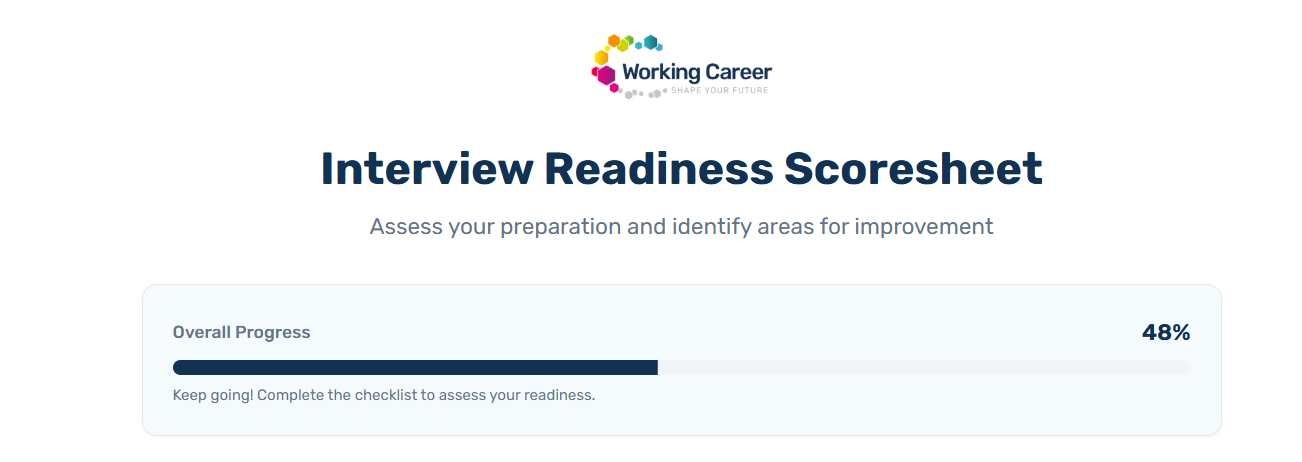Why Your Mind Goes Blank in Interviews and How to Stay Calm: A Psychologist’s Guide
Many people believe going blank in a job interview means they were unprepared. In reality, it is a natural stress reaction. Your brain is trying to protect you, not undermine you.
When you understand this response, you can learn to stay calm, think clearly and answer questions with confidence. This article explains why minds go blank, what an amygdala hijack is and the steps that help you stay in control during high-pressure moments. It also shows how interview coaching gives you the tools to perform at your best.
Why Minds Go Blank in Interviews
When you walk into an interview and feel your heart race, your brain switches into threat mode. Your body reacts as if you are unsafe, even though the situation is not dangerous. This affects memory, speech and attention. It becomes harder to recall examples, structure your answers or think clearly.
This is why even experienced professionals can suddenly lose their words.
What Is an Amygdala Hijack?
The amygdala is the part of the brain that scans for threats. It works fast and acts before your logical thinking brain can interpret what is happening. When it takes over, this is known as an amygdala hijack.
During an amygdala hijack:
Your heart rate rises
Your breathing becomes shallow
Your muscles tense
Your thinking becomes narrow
Your working memory switches off temporarily. This is why your mind can feel empty right when you need it most. It is the same mechanism behind performance anxiety, stage fright and public speaking nerves.
Why This Happens in Job Interviews
Interviews shape careers and futures. The stakes feel high. Your brain interprets pressure as danger and steps in to protect you from embarrassment, rejection or mistakes. That protective response blocks the calm thinking you need.
Understanding this mechanism is the first step in learning to manage it.
How to Stop Your Mind Going Blank
You can train your brain to return to a calm state more quickly. These steps help you stay grounded and access clear thinking.
1. Slow Your Breathing
A slow breath signals safety to your nervous system. Try breathing in for four seconds and out for six seconds. This simple pattern lowers your heart rate and helps your thinking brain come back online.
2. Ground Yourself in the Room
Notice your feet on the floor. Feel the support of the chair. This keeps you in the present moment and stops your mind from running ahead.
3. Use a Short Pause
Pausing before you answer is a sign of control, not uncertainty. It gives your brain the moment it needs to organise your thoughts.
4. Use a Simple Answer Structure
A structure such as the STAR method keeps your responses clear and focused. It helps you stay on track even when adrenaline is high.
5. Prepare a Story Bank
A story bank is a small set of examples you practise ahead of time. These stories act as anchors. When your mind goes blank, they help you recover quickly.
How Interview Coaching Helps You Stay Calm and Think Clearly
Many people try to prepare for interviews by reading long lists of questions or memorising answers. This can increase pressure rather than reduce it. Working with an experienced interview coach gives you personalised tools that help your brain stay calm and focused.
Interview coaching helps you:
Understand your personal triggers for interview nerves
Learn practical techniques to control your breathing and body response
Build confidence through guided interview preparation coaching
Improve your structure, clarity and communication
Strengthen your interview skills coaching through realistic practice
Build a story bank that fits the roles you are applying for
Reduce anxiety by rehearsing in a safe, supportive environment
A specialist interview coach also notices patterns you may not see yourself. This fast-tracks confidence, performance and clarity.
How I Can Help
As a psychologist and interview coach in the UK, I specialise in helping people who struggle with nerves, blank moments and performance pressure. My approach combines job interview coaching with evidence-based psychological tools.
I help clients:
Stay calm during high-stakes interviews
Use science-backed techniques to manage nerves
Create strong and memorable answers
Practise in a way that builds confidence rather than anxiety
Prepare for competency interviews, panel interviews and senior roles
Feel grounded and ready even when the pressure is high
My interview preparation coaching gives you the structure, strategy and emotional tools you need to perform at your best. You are not “bad at interviews.” You simply need the right support for how your brain works under pressure.
Final Thoughts
A blank mind in an interview is not a sign of failure. It is a normal biological response. By understanding how the amygdala works and practising simple techniques, you can stay calm, think clearly and present your strengths with confidence.
Interview coaching gives you the support, tools and practice you need to overcome nerves and perform at your best.
Keywords: interview coaching, interview coach, job interview coaching, interview preparation coaching, interview coaching UK, interview skills coaching, interview nerves, amygdala hijack, mind goes blank in interview, how to stay calm in an interview, interview anxiety
Get Started with a Free Interview Preparation Tool - The Interview Readiness Scoresheet
The Interview Readiness Scoresheet gives you a simple way to understand how prepared and confident you are for your next interview. Many people focus on the wrong areas or underestimate their strengths. This tool helps you see exactly where you’re ready and where a small improvement could make a big difference.
The scoresheet helps you:
• check your preparation across the key areas interviewers look for
• spot gaps in your examples, structure or confidence
• understand how nerves might affect your performance
• rate your answers and mindset so you know what to work on
• take clear, practical steps to strengthen your interview skills
It’s quick, simple and designed to support people who struggle with nerves or blank moments. It works especially well alongside interview preparation coaching or mock interviews, helping you build awareness, track progress and stay focused on the areas that matter most.
If you want a calm, structured way to get ready for your next interview, the Interview Readiness Scoresheet is a great place to start.
About Diana
Diana Dawson is a psychologist and interview coach based in the UK. She specialises in helping professionals stay calm, focused and confident in high-pressure interviews.
With more than 20 years of experience in career, executive and wellbeing coaching, Diana combines psychology, neuroscience and practical interview preparation coaching to help clients perform at their best. She works with people who struggle with nerves, blank moments and performance pressure, and teaches simple, effective techniques that make interviews feel more manageable.
Diana has supported clients across sectors including finance, education, public services, health and leadership roles. Her approach is calm, evidence-based and tailored to each person’s needs. Whether you want to improve your interview skills, structure your answers clearly or learn how to manage anxiety, Diana provides a supportive space to practise, grow and gain confidence.
She offers one-to-one interview skills coaching, job interview coaching and interview preparation coaching for professionals at all stages of their careers.
To learn more or book a free introductory call, you can visit Working Career or get in touch directly.


